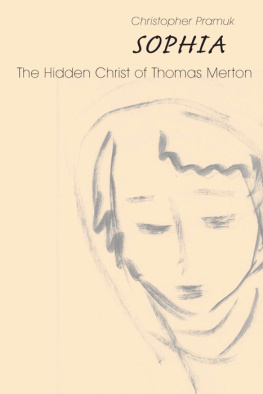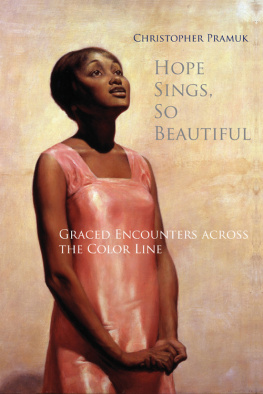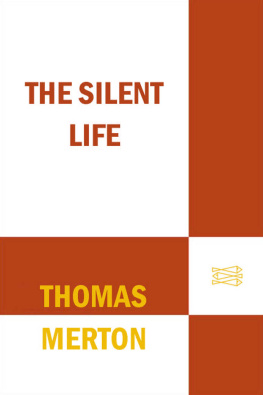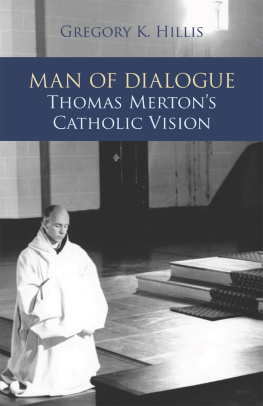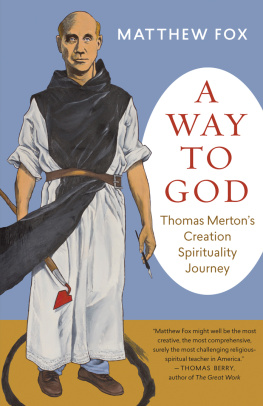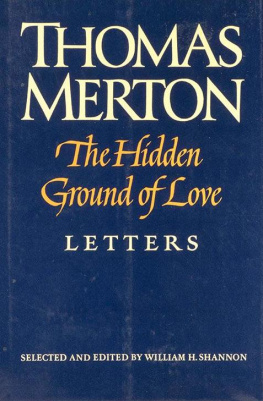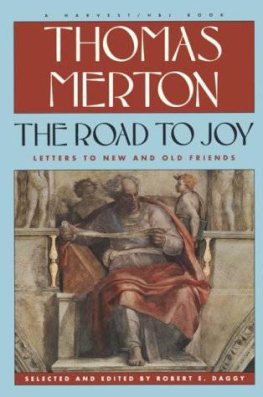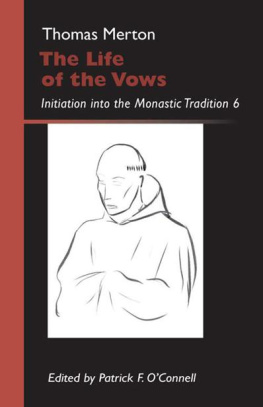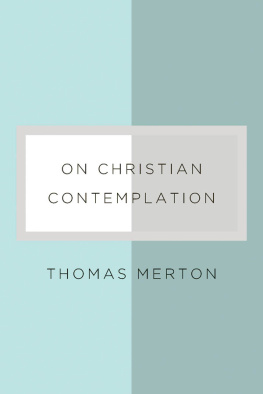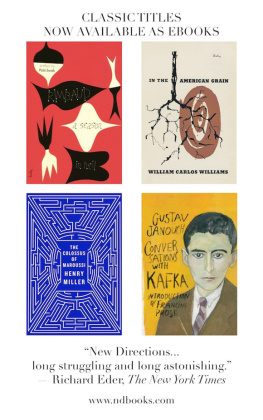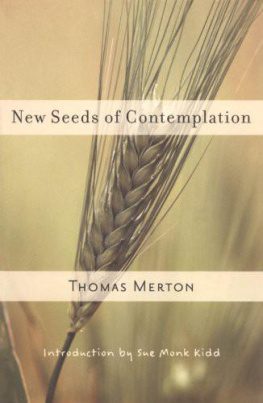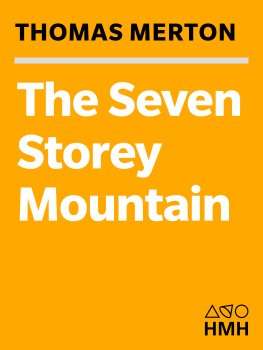Many books have appeared on Thomas Merton in the four decades since his untimely death, but this illuminating interpretation of his theology breaks completely new ground. Readers who love Merton will meet him again as never before in this wise and balanced commentary. New readers encountering Merton for the first time will discover why this passionate Trappist monk is rightly considered one of the spiritual giants of our age. And best of all, in Christopher Pramuk we encounter the spiritual depth, intellectual acuity, and compassionate humanity of Merton himself.
Kevin F. Burke, SJ
Dean, Jesuit School of Theology
Santa Clara University, Berkeley Campus
Christopher Pramuks Sophia: The Hidden Christ of Thomas Merton is, dare it be said, a gorgeous book. Its beautifully crafted pages are full of insight about Merton and his sapiential theological method, the poetical and mystical manner in which he lived into the rich symbolic matrix of faith and drew from it living wisdom, made luminous by his engagement with non-western religions, Eastern Orthodox thought, and the kataphatic and apophatic modes of knowing of his own tradition. Moreover, Sophia invites the reader into a compelling meditation on the doing of theology in the contemporary world. It affirms the need for a bold theological imagination and a faith intensely aware of Sophia, the divine presence alive in the world.
Wendy M. Wright
Professor of Theology
John C. Kenefick Faculty Chair in the Humanities
Creighton University
Sophia: The Hidden Christ of Thomas Merton is a luminous, even mesmerizing, essay on the very nature of theology itself. Pramuk illuminates not only Mertons profound Christological vision, but places that in thought-provoking conversation with the great Russian theologians whoduring a century of bitter strifewere irradiated by the mysterious figure of Wisdom. This work will be of deep interest to students of Christology, of Merton, of contemporary theology, and to all who pause in wonder before the recovering encounter of theology and the mystical.
Mark A. McIntosh
Van Mildert Professor of Divinity
The University of Durham, United Kingdom
Pramuks work is, far and away, the most sophisticated theological study ever done on the writings of Thomas Merton. It sets a very high bar for anyone else who intends to comment on the writings of the monk whose writings, nearly a half century after his death, still exert such a powerful influence on contemporary religious seekers.
Lawrence S. Cunningham
John A. OBrien Professor of Theology
The University of Notre Dame
Sophia
The Hidden Christ of Thomas Merton
Christopher Pramuk

A Michael Glazier Book
LITURGICAL PRESS
Collegeville, Minnesota
www.litpress.org
A Michael Glazier Book published by Liturgical Press
Cover design by David Manahan, OSB. Cover drawing by Thomas Merton. Used with permission of the Merton Legacy Trust and the Thomas Merton Center, Bellarmine University.
Excerpts from documents of the Second Vatican Council are from Vatican Council II: The Basic Sixteen Documents , by Austin Flannery, OP 1996 (Costello Publishing Company, Inc.). Used with permission.
Unless otherwise noted, Scripture texts in this work are taken from the New Revised Standard Version Bible: Catholic Edition 1989, 1993, Division of Christian Education of the National Council of the Churches of Christ in the United States of America. Used by permission. All rights reserved.
2009 by Order of Saint Benedict, Collegeville, Minnesota. All rights reserved. No part of this book may be reproduced in any form, by print, microfilm, microfiche, mechanical recording, photocopying, translation, or by any other means, known or yet unknown, for any purpose except brief quotations in reviews, without the previous written permission of Liturgical Press, Saint Johns Abbey, PO Box 7500, Collegeville, Minnesota 56321-7500. Printed in the United States of America.
1 2 3 4 5 6 7 8 9
Library of Congress Cataloging-in-Publication Data
Pramuk, Christopher.
Sophia: the hidden Christ of Thomas Merton / Christopher Pramuk.
p. cm.
A Michael Glazier book.
Includes bibliographical references.
ISBN 978-0-8146-5390-6
Ebook ISBN 978-0-8146-5713-3
1. Merton, Thomas, 19151968. 2. God (Christianity)Wisdom. 3. Jesus
ChristPerson and offices.I. Title.
BX4705.M542P73 2009
231.6dc22
2009024583
For my parents, Jack and Gladys Pramuk,
who immersed me in music, and Merton, from the very beginning.
And in loving memory of Vincent J. OFlaherty, SJ
The waking have one common world,
but the sleeping turn aside each into a world of his own.
He that is awake lights up from sleeping.
Herakleitos, 5th Century BCE
Awake, O sleeper,
and arise from the dead,
and Christ will give you light.
Ephesians 5:14 (NAB)
The helpless one, abandoned to sweet sleep,
him the gentle one will awake: Sophia.
Thomas Merton, 1962
Contents
Acknowledgments
If theology can be described as a lifelong conversation with wonder and mystery, then I have been blessed beyond merit or measure with the best conversation partners one could hope to find. First of these is my wife Lauri, whose companionship remains the greatest wonder of my life. Likewise I want to thank my two children, Isaiah and Grace, and my extended family near and far, who make me smile and laugh (and sing) a lot, and keep me rooted firmly to the earth.
Of the many mentors and colleagues who have given inspiration and encouragement along the way, special thanks go to Kevin Burke, SJ, whose friendship has sustained me immeasurably for nearly twenty years. It was in conversation with him that the seeds for this study were first planted. Likewise to Tom Esselman, CM, and Roger Haight, SJ, who together share at least some of the blame for igniting my love for the discipline of theology. During the writing of this book I was especially supported by Ernesto Valiente and Stephen Belt, two friends whose magnanimity and passion for life have taught me more than I can say, and by my wonderful colleagues in the Theology Department at Xavier University.
I will forever be grateful to Lawrence Cunningham of the University of Notre Dame, who generously guided my doctoral research on Thomas Merton, and without whose encouragement this book would have never seen the light of day. Like Merton, Larrys extraordinary facility with the written word continues to form, challenge, and inspire my own approach to theology. Less directly but no less significantly, I am indebted to the worldwide community of Merton scholars whose work precedes and informs my own everywhere in these pages. Among these I especially wish to thank Patrick OConnell, Christine Bochen, and William Shannon, coauthors of The Thomas Merton Encyclopedia ; Brother Patrick Hart; Christopher Nugent; Canon A. M. Allchin; and Paul Pearson, the director of The Thomas Merton Center at Bellarmine University.
Finally, I am immensely grateful to all at Liturgical Press who embraced this project and helped see it through to completion, not least my gifted editor Mary Stommes, and editorial director Hans Christoffersen. May God bless and sustain the remarkable work that religious publishers do, day in and day out, in service of the church, the theological community, and spiritual pilgrims everywhere.
* * * *
Hagia Sophia. By Thomas Merton, from EMBLEMS OF A SEASON OF FURY, copyright 1963 by The Abbey of Gethsemani. Reprinted by permission of New Directions Publishing Corp.
Thomas Merton, from BREAD IN THE WILDERNESS, copyright 1953 by Our Lady of Gethsemani Monastery. Reprinted by permission of New Directions Publishing Corp.
Next page
